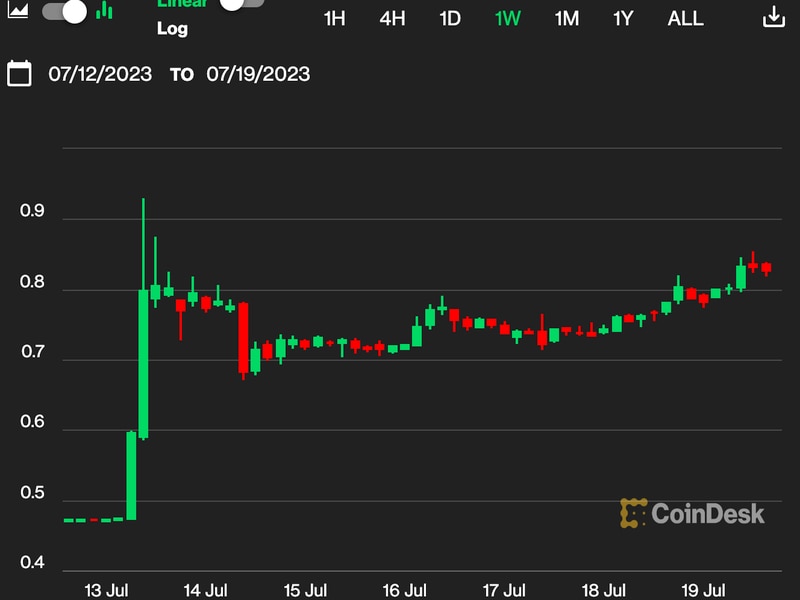Bitcoin Prices Show Positive 30-Day Correlation With China’s Central Bank Balance Sheet
-
Bitcoin’s price has been positively correlated with the size of the People’s Bank of China’s (PBOC) balance sheet over the past eight years.
-
The PBOC is considering a massive stimulus of up to 1 trillion yuan ($142 billion) to bolster its economy, leading to a surge in Asian stock markets, including a notable rise in the CSI 300 Index.
-
Some say this stimulus could indirectly benefit bitcoin by potentially increasing investments in blockchain and crypto-related ventures.
Bitcoin (BTC) prices seem to have tracked the growth in the Chinese central bank’s balance sheet over the past eight years, maintaining a notable positive 30-day correlation.
The People’s Bank of China (PBOC), holds roughly $6.22 trillion worth of U.S. dollars on its balance sheet. At press time, the 30-day correlation coefficient between bitcoin’s price and the PBOC’s balance sheet size was 0.66, according to data source TradingView. Its always been positive except 2016 and from late 2022 to 2023. On the other hand, as of writing, bitcoin had a -0.88 correlation over 30 days with the Federal Reserve’s balance sheet, the lowest on record since 2016.
A strong correlation means a co-efficient of 0.6-0.9, and 0.8-1 is considered a very strong correlation. Correlations are a statistical measure of how two variables are related and can be used in financial markets to predict or track asset prices.
The positive correlation is noteworthy as early this week, the PBOC said it was considering injecting up to 1 trillion yuan ($142 billion) of capital into its biggest state banks to increase their capacity to support the struggling economy.
The central bank also cut the reserve requirement ratio for mainland banks by 50 basis points (bps) while lowering the seven-day reverse repo rate – the interest rate at which a central bank borrows funds from commercial banks – by 20 bps to 1.5%.
BTC has gained nearly 3% this week and is up over 10% for the month, according to CoinDesk data. Asian stocks led by China have also surged in the wake of PBOC’s stimulus bazooka. The CSI 300 Index of large-cap shares soared 4.5% on Friday, bringing this week’s gain to 16% in the biggest run since 2008.
:format(jpg)/cloudfront-us-east-1.images.arcpublishing.com/coindesk/7NZYJPCJOFB57GEDGLB7ADWUQY.png)
Like the U.S., China’s stimulus aims to lower unemployment and spur business growth. The new inflow of cash could indirectly push up the price of Bitcoin, particularly from a long-term perspective, market analyst Nick Ruck told CoinDesk in a Telegram message on Friday.
“The stimulus could lead to increased investment in blockchain companies that may include mining technology and startups,” Ruck said. “Select funds may also be able to increase exposure to crypto-related investments offshore, such as in stock-listed firms and ETFs in Hong Kong.”
The bump won’t be limited to bitcoin, some say, as all riskier assets are expected to get a boost in the coming months.
“It’s all the green light for global risk markets as U.S. equities hit new ATHs for the 3rd time this week, helped by a rapid-fire of furious stimulus to resuscitate the long-struggling Chinese economy,” Augustine Fan, head of insights at SOFA, told CoinDesk. “This has led macro observers to turn explicitly bullish on all risk assets in the interim, with a seemingly globally synchronized easing move that was reminiscent of the easy-money days from the QE era.”
“Naturally, crypto prices are still highly correlated to equity performance. However, investor sentiment seems to have flipped to a ‘buy the dip’ mode, and risk-reward favors a continued rally with no or little downside catalysts in sight,” Fan added.
Edited by Omkar Godbole.
Disclosure
Please note that our
privacy policy,
terms of use,
cookies,
and
do not sell my personal information
has been updated
.
CoinDesk is an
award-winning
media outlet that covers the cryptocurrency industry. Its journalists abide by a
strict set of editorial policies.
In November 2023
, CoinDesk was acquired
by the Bullish group, owner of
Bullish,
a regulated, digital assets exchange. The Bullish group is majority-owned by
Block.one; both companies have
interests
in a variety of blockchain and digital asset businesses and significant holdings of digital assets, including bitcoin.
CoinDesk operates as an independent subsidiary with an editorial committee to protect journalistic independence. CoinDesk employees, including journalists, may receive options in the Bullish group as part of their compensation.
:format(jpg)/s3.amazonaws.com/arc-authors/coindesk/6c6bb5af-692c-4fcf-9f8b-a75d0549effd.png)
Shaurya is the Deputy Managing Editor for the Data & Tokens team, focusing on decentralized finance, markets, on-chain data, and governance across all major and minor blockchains.
Follow @shauryamalwa on Twitter
:format(jpg)/author-service-images-prod-us-east-1.publishing.aws.arc.pub/coindesk/7fe88428-ae49-4453-ab19-5cfbf125689b.png)
As the senior analyst at CoinDesk, James specializes in Bitcoin and the macro environment. Previously, his role as a research analyst at Swiss hedge fund Saidler & Co. introduced him to on-chain analytics. He monitors ETFs, spot and futures volumes, and flows to understand Bitcoin’s financial interactions.
Follow @btcjvs on Twitter









